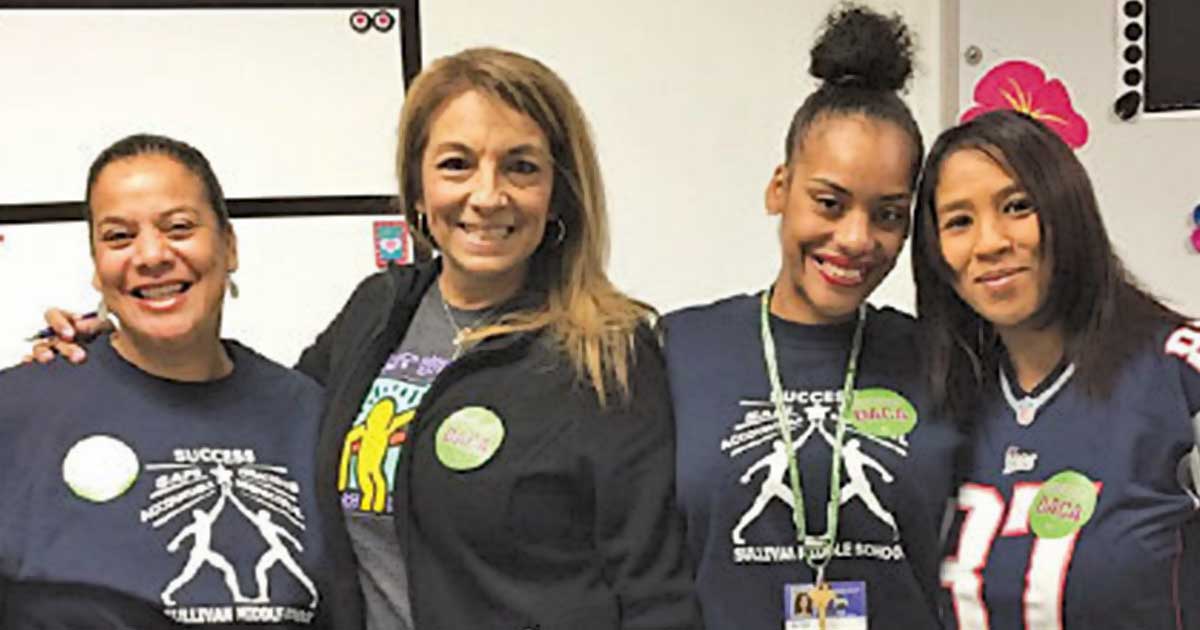Help for Hurricane Victims
Find opportunities to donate to victims of Hurricans Harvey, Irma and Maria.
Providing a vital link for students from Puerto Rico
Laura Barrett,
Communications Specialist

"I have one student who came here from Puerto Rico after the storm," said Yahaira Rodriguez, a paraeducator at the Sullivan Middle School in Worcester. "The language barrier is the hardest part. He doesn’t speak any English. I translate for him and other students.
"Also, the school systems here and in Puerto Rico are very different. In Puerto Rico the schools are smaller and students don’t go from class to class — they just stay with one teacher. Here, it is easy to get lost and confused. It’s hard to process everything that’s going on in school."
Her new student, a seventh-grade boy living in Worcester with his aunt, is one of more than 800 students from the island who have enrolled in public schools in Massachusetts since Hurricane Maria struck on Sept. 20, killing at least 51 residents, destroying homes and uprooting lives.
As of late October, about 80 percent of the island’s residents were still without power. Many did not have clean drinking water or cellphone reception, and there were long lines for everything — from getting money out of an ATM to obtaining food and fuel.
According to the Department of Elementary and Secondary Education, the largest numbers of these "internal refugees" from Puerto Rico enrolled in schools in Springfield, New Bedford, Worcester, Lowell, Holyoke, Lawrence and Boston.
Rodriguez can relate to the stress that many from the island are feeling. Her own family is still living in a mountainous region of Puerto Rico and she can only communicate sporadically with relatives.
"I tell teachers in my school I know you can be sympathetic but it’s not the same thing as having experienced it," she said, referring both to newcomers and longtime residents who still have family members on the island. "Their body is going to be in school but their mind is not going to be there. They worry that their family doesn’t have the luxury of those basic needs of electricity, water and food. I let them know I understand. My family is there, too.
"After the storm I came down crying," she said. "The students sympathized with me and I sympathized with them."
Rodriguez added, "I have a very big family. My grandfather is 97. They don’t want to leave. They are afraid that if they leave, people might try to steal what little they have left."
Find opportunities to donate to victims of Hurricans Harvey, Irma and Maria.
School systems such as Worcester’s rely heavily on bilingual paraeducators to translate for students and to help them become assimilated.
"Getting assimilated is a slow process," Rodriguez said. "Some people don’t understand how difficult it is to be in a classroom when you don’t understand the language. You can be sympathetic, but until you are in that position you don’t know what it is like.
"It’s not just the language, but also the culture that is different," she continued. "Here kids are from everywhere. They talk different languages and have different cultures. In Puerto Rico, everyone is from Puerto Rico. Even the lunches are different. There they mostly eat rice, beans and chicken for lunch. Here it is something different every day."
Rodriguez said she is available to help families uprooted by the storm to connect with services, such as signing up for MassHealth. As a paraeducator, she wishes that the pay and respect that education support professionals receive matched their responsibilities and skills — skills that must be fully deployed when crises strike and newcomers arrive in the middle of the school year.
This story initially appeared in the Fall 2017 edition of MTA Today.